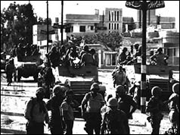 |
| The USSR is demanding
Israeli troops withdraw from Arab
territories |
|
1999: NATO calls off air war on
Kosovo |
Artificially 1969:
The The United
Nations Security Council has rejected Soviet demands for an immediate vote
on a resolution condemning Israel's aggression in the six-day war.
Moscow - which has close ties with Egypt - is also demanding the
withdrawal of Israeli troops from Arab territories. It follows six days of
fighting in which Israel has made advances on three fronts doubling the
area of land it controls.
Israel says the attacks were launched to counter huge Arab troop
movements along its borders.
It has seized Gaza and the Sinai Peninsula from Egypt in the south and
the Golan Heights from Syria in the north.
It has also pushed Jordanian forces out of the West Bank and East
Jerusalem.
The advances ended with ceasefires signed as Israeli troops were poised
within striking distance of each of the respective capitals, Cairo in
Egypt, Damascus in Syria and Amman in Jordan.
It is not clear what action Moscow will take in the face of the UN's
hesitation. The council has postponed making a decision on how to respond
to the war until tomorrow at the earliest.
Thousands forced to flee
Israel has already declared its intention to remain in control of its
newly occupied territories until permanent peace with its Arab neighbours
can be established.
Israel's casualties after six days of fighting are calculated at 759
dead and about 3,000 wounded, Arab casualties are far higher, about
15,000.
The scale of the refugee problem caused by the war is also now becoming
clear.
The International Committee of the Red Cross is making preparations to
help thousands of Egyptian soldiers stranded in the Sinai desert after
last week's bitter fighting. Water supplies to the area were cut off in
the hope of slowing the Israeli advance.
Gaza City in the Gaza Strip saw some of the fiercest fighting
between Egyptians and Israelis during the brief war. It is estimated there
are now some 200,000 Arabs living in five camps outside the city. Many
have not eaten for days.
The United Nations Relief and Works Agency is appealing for help to buy
tents, blankets and vehicles and has also asked for medical supplies.
It says many of the refugees in Jordan are homeless for a second time -
having been forced to flee the camps outside Jericho which had been their
homes since the 1948 Arab-Israeli war.
The British Government is contributing towards the cost of the
emergency relief, as are many Arab countries, including Saudi Arabia which
is donating half a month's salary per soldier in its armed
forces.